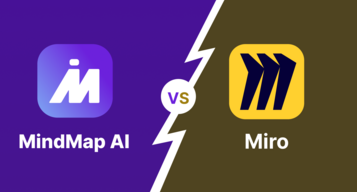MindMap AI vs Miro
Explore which mind mapping tool offers more interactivity, intelligent automation, and flexibility, whether you're working solo or with a team

Looking for a Miroboard Alternative?
Miro (commonly known as miroboard or miro online) is a widely-used whiteboard platform for collaborative teams. While it offers some AI features and robust integrations, it?s primarily built for real-time collaboration, not individual productivity or deep AI-powered brainstorming.
MindMap AI, on the other hand, is purpose-built for structured idea generation using AI, enabling both manual and AI-powered mind mapping simultaneously.
If you're comparing Miro mindmap tool with a next-gen alternative, this guide breaks down the key differences in AI functionality, usability, pricing, and tool support.
MindMap AI: The AI-Powered Edge Over Miro
Unlike Miro, where AI-generated mind maps must be applied to the canvas before manual editing, MindMap AI allows a true hybrid experience interactively working with AI and manually editing at the same time.
AI Copilot Chat
Engage with AI to brainstorm, refine, expand, and summarize ideas. Miro's AI lacks continuous interaction.
Multi-Format Input
Generate mind maps from text, PDFs, images, audio, CSVs, and video. Miro supports only text-based input with templates.
AI-Driven Second-Order Connections
Identifies and links related ideas intelligently.
Made for Individuals and Teams
MindMap AI works great solo or with your team.
Effortless Sharing
Share mind maps privately or publicly with ease.
Flexible Downloads
Save mind maps in PNG, SVG, SVG HTML, PDF, CSV, Markdown, or Project format for offline use and smooth compatibility.
What is Miroboard? A Quick Overview Before the Comparison
Miro (also referred to as miroboard or miro online) is a whiteboard tool used for brainstorming, planning, and visual collaboration. However, Miro?s AI works in a limited context, you can?t continue chatting or refining interactively with AI once the mind map is placed. This breaks the flow for users who want an ongoing back-and-forth with AI throughout their process.
Additionally, Miro?s visuals (like images or icons) are applied to the canvas, not directly to individual nodes, making detailed mind mapping more cumbersome. Miro excels in enterprise use cases, workshops, and design sprints but may feel heavy or team-focused for individual users or students seeking a more agile, AI-driven workflow.
Miro vs MindMapAI: Feature-by-Feature Comparison
AI-Powered Features
| Feature | MindMap AI | Miro |
|---|---|---|
| AI-Powered Interactive Assistance | ✅ | Limited |
| AI Idea Expansion | ✅ | ✅ |
| AI Summarization | ✅ | ✅ |
| AI Topic Focus | ✅ | ❌ |
| AI-Driven Second-Order Connections | ✅ | ❌ |
| Retry Prompt for Free | ✅ | ❌ |
| Multi-Format Input Support (Text, PDFs, CSV, Images, Audio, Video, Markdown, HTML, XML, and JSON) |
✅ | ❌ |
Core Mind Mapping Features
| Feature | MindMap AI | Miro |
|---|---|---|
| Manual Mind Maps & Topics for Free | Unlimited | 3 editable boards |
| Themes & Customization | ✅ | ✅ |
| Share as Private or Public Links | ✅ | ✅ |
| Export to Image, PDF, CSV, and Project | ✅ | ✅ |
| Export to SVG, and Markdown | ✅ | ❌ |
| Add Images/Icons to Nodes | ✅ | ❌ |
| Navigation & Layout | ✅ | ❌ |
| All-time Version History | ✅ | ❌ |
| Watermark-Free Exports | ✅ | ✅ |
| Keyboard Shortcuts | ✅ | ✅ |
Accessibility & Platform Support
| Feature | MindMap AI | Miro |
|---|---|---|
| Web App (No Installation Required) | ✅ | ✅ |
| Desktop App (Windows/Mac) | ❌ | ✅ |
| Mobile App (iOS/Android) | ✅ | ✅ |
| Chrome Extension | ? | ❌ |
Pricing & Value Comparison
| Plan Type | MindMap AI | Miro |
|---|---|---|
| Free Plan | ✅ | ✅ |
| Monthly Paid Plans |
Basic: $7.49/month Pro: $14.99/month |
Starter: $8/mo per member Business: $16/mo per member |
| Lifetime Plans | ✅ | ❌ |
| Add-on Credits | ✅ | ❌ |
MindMap AI vs Miro: Pros & Cons
MindMap AI
Pros
-
✓
AI-Powered Copilot
Generate, refine, expand, and summarize mind maps using real-time AI chat.
-
✓
Hybrid Workflow
Seamlessly alternate between AI support and manual editing at any stage. Engage AI when needed or opt for full manual control.
-
✓
AI Summarization & Topic Focus
Summarize branches directly within your mind map, or use AI Focus to isolate and expand any topic into a new mind map.
-
✓
AI-Driven Second-Order Connections
Uncover hidden relationships between ideas to reveal deeper patterns and insights, all mapped visually with AI.
-
✓
Multi-Format Content Input
Easily create maps from text, PDFs, images, videos, audio, CSVs, and more.
-
✓
Lifetime Plan Option
One-time payment available, unlike Miro's recurring team-based pricing.
-
✓
Built for Individuals & Small Teams
Ideal for personal brainstorming while still making it easy to share mind maps with your team when needed.
Cons
-
✗
No Desktop App Yet
Web and mobile only, desktop version is under consideration.
-
✗
No Real-Time Co-Editing Yet
Collaborators can view and edit, but not simultaneously in real-time.
Miro
Pros
-
✓
Powerful Team Collaboration
Real-time co-editing with built-in video calls, voting, timers, and interactive presentation.
-
✓
Enterprise-Ready Platform
Offers advanced integrations, and robust desktop apps, making it ideal for large teams.
Cons
-
✗
Limited AI Interaction
No ongoing AI chat after adding content; only select features like summarization remain available.
-
✗
Images Aren?t Node-Attached
Visuals are placed on the canvas, not tied to specific nodes.
-
✗
Limited Free Usage
Only 3 boards in the free plan, must upgrade for ongoing use.
-
✗
No Annual or Lifetime Plan
Only monthly subscriptions available, with recurring costs per user.
-
✗
Too Team-Focused for Solo Users
Designed around enterprise use, individuals may find it bloated or pricey.
